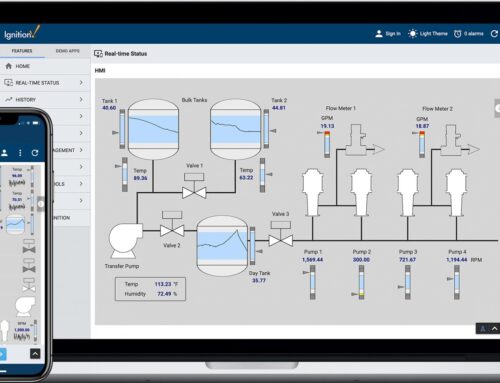In an era where food safety, traceability, and compliance are paramount to both operational integrity and consumer trust, the seamless integration of robust IT solutions is critical for manufacturers within the food industry. Inductive Automation’s ignition SCADA platform emerges as a formidable ally in this domain, revolutionizing how food manufacturers manage and monitor their production processes to ensure adherence to strict regulatory standards. By leveraging Ignition’s advanced capabilities, companies can maintain a meticulous record of their production activities, enforcing openness and enabling rapid response to potential safety concerns.
Through its flexible architecture, Ignition SCADA offers unparalleled benefits for food safety and traceability:
- Real-Time Monitoring and Alerts: Ignition’s real-time data acquisition capabilities allow manufacturers to monitor critical control points across production lines continuously. Automated alerts for deviations from set parameters ensure swift corrective actions, thus maintaining product integrity.
- Extensive Traceability: By seamlessly integrating with existing MES and ERP systems, Ignition provides end-to-end traceability, enabling manufacturers to track ingredients from receipt to finished product. This traceability is crucial for compliance with global food safety regulations such as the FDA’s Food Safety modernization Act (FSMA) or the European Union’s General Food Law.
- Enhanced Data Reporting for compliance: With Ignition’s extensive reporting tools, generating compliance records and audit-ready reports becomes streamlined. This functionality not only facilitates adherence to industry standards but also positions companies to respond effectively during regulatory audits.
For example, consider a dairy manufacturer utilizing Ignition SCADA to track and document pasteurization temperatures. Through real-time temperature monitoring and automatic report generation, the company can ensure that each batch is processed safely and efficiently, complying with stringent pasteurization standards.
In this article,we will delve deeper into the strategic advantages of Ignition SCADA for food manufacturers,exploring deployment best practices and highlighting potential pitfalls to avoid. With Innorobix’s decades of experience in the design,deployment,and support of Ignition solutions,we stand ready to guide you in harnessing the full potential of Ignition for food safety,traceability,and compliance.
Understanding the Role of Ignition SCADA in Enhancing Food Safety and Traceability
in the food and beverage industry, ensuring food safety and robust traceability is paramount to maintaining consumer trust and meeting stringent regulatory requirements. Ignition SCADA (Supervisory Control and Data Acquisition) plays a pivotal role in advancing these goals by providing real-time monitoring, comprehensive data logging, and seamless integration across production environments. Through its flexible architecture, Ignition SCADA enables manufacturers to respond swiftly to potential contamination events. As an example, consider a scenario where a certain batch of dairy products is suspected of contamination.Ignition’s dynamic data models and historian capabilities can swiftly trace back the production lineage, identifying specific times, equipment, and process variables involved, ensuring a rapid, accurate response that mitigates risk.
Moreover,ignition SCADA supports meticulous compliance with food safety standards such as HACCP,FSMA,and ISO 22000,thanks to its advanced reporting and auditing tools.These tools capture and analyze every critical control point and deviation, providing actionable insights and creating alerts to prevent mishaps before they occur. Additionally, with Ignition’s open API and integrative capabilities, integration with ERP and MES systems fosters an end-to-end traceability solution, making paper trails obsolete. This seamless data flow supports not only compliance but also optimizes operational efficiency and reduces administrative overhead. Ignition clients, like a well-known North American beverage producer, have utilized its capabilities to achieve a remarkable reduction in traceability reporting time, dropping from several hours to mere minutes, showcasing its transformative impact on food safety management.
Implementing Real-Time Monitoring with Ignition SCADA for Food Manufacturers
In the dynamic world of food manufacturing, maintaining product quality and ensuring safety compliance are paramount. Implementing real-time monitoring through Ignition SCADA empowers food manufacturers to achieve these objectives with unparalleled efficiency. Ignition’s robust data acquisition capabilities enable plant managers to track production processes in real-time,facilitating immediate adjustments to maintain quality and compliance. For example, consider a processing line for dairy products where temperature control is critical. Ignition SCADA can provide continuous feedback on temperature deviations, triggering alerts and adjustments instantly to prevent spoilage and ensure rigorous adherence to safety standards. This level of monitoring not only ensures compliance with regulatory requirements but also enhances traceability by logging past data for future audits.
Among its myriad features, Ignition SCADA excels in offering a comprehensive view of the plant floor through its centralized dashboards, which can be customized to display key performance indicators (KPIs) specific to the food industry. Food manufacturers benefit from insights into machine efficiency, production downtime, and resource utility in a visually intuitive format. As a notable example,a bakery utilizing Ignition SCADA can monitor oven temperatures,dough mixture consistency,and packaging speeds from a single interface. By integrating real-time data with historical trends, plant managers can identify bottlenecks and optimize operations effectively. Additionally, with Ignition’s flexibility, these dashboards are accessible on various devices, ensuring that critical data is always at hand for decision-makers, whether they’re in the production facility or managing remotely.
Leveraging Ignition’s historical Data Analysis for Compliance and Audit Preparedness
Integrating Ignition SCADA into your food manufacturing operations can significantly enhance your compliance strategy by utilizing powerful historical data analysis tools. Historical data analysis is pivotal in maintaining food safety standards and ensuring traceability throughout your production process. Ignition seamlessly captures and stores massive amounts of data from various sources,such as temperature sensors,batch records,and processing times,into its SQL database. This ensures that you have an accurate and comprehensive record of production activities readily accessible for compliance checks. Real-world examples include achievements by companies in the dairy sector, where detailed historical records enabled them to trace the source of contamination swiftly, minimizing product recalls and safeguarding their reputation.
By leveraging Ignition’s strategic capabilities, manufacturers can prepare for audits with a robust data-backed approach. Auditors demand precise traceability and adherence to standards, and Ignition’s event-tagging and alerting systems alert you to compliance drifts, allowing for proactive adjustments. Furthermore, you can extract reports showing compliance-related metrics such as Critical Control Points (CCPs) and processing deviations, directly from Ignition’s historian. These reports can be customized to meet specific industry standards like HACCP, FSMA, or ISO 22000, further streamlining compliance efforts. As a notable example,a fruit processing plant might use Ignition to log temperature data of their refrigerated containers,creating a reliable record that fulfills both regulatory standards and customer demands.
Expert Recommendations for Optimizing Traceability Systems Using Ignition
Optimizing traceability systems within the Ignition platform begins with strategically designing your tags and database structures to seamlessly align product,process,and quality data. A unified data model in Ignition leverages Standard SQL databases and tag providers, enabling real-time tracking across every critical control point within the plant. when structuring your tags, it’s crucial to define naming conventions that reflect the product lifecycle, from raw material reception to final product shipment.This consistent framework provides an instant overview of any product’s status at any moment, facilitating rapid responses to potential quality issues. As an example,a leading dairy producer implemented Ignition to synchronize data from multiple silos and processing lines,reducing trace time from hours to minutes by integrating their batch processing data with supply chain logistics.
Deploying advanced visualization dashboards in Ignition enhances traceability by offering a clear view of operations through customizable templates and reports. Focus on coupling visual elements with actionable insights, facilitating swift decision-making.Utilize Ignition’s Perspective Module to create web-kind, responsive interfaces that can be accessed from any device, ensuring stakeholders have immediate access to system status and alerts. Critical alerts can be configured to trigger notifications through SMS or email, enabling proactive management. in one practical request, a beverage manufacturer used Ignition to connect their lab test results with real-time process data, allowing quality managers to automatically generate compliance reports with a single click. By operationalizing such seamless integrations and user-centric designs, manufacturers can achieve not only regulatory compliance but also reduced downtime and enhanced product quality.
Q&A
Q1: how does Ignition SCADA enhance food safety in manufacturing environments?
A1: Ignition SCADA enhances food safety by providing real-time monitoring and control, ensuring that all critical parameters are within safe limits:
- Continuous Monitoring: Real-time data acquisition from sensors and devices monitors critical points such as temperature and humidity.
- Automated alerts: Automatically notifies operators via email or SMS when a parameter goes out of predefined safe limits.
- Data Visualization: Offers intuitive dashboards and HMI that display current and historical data for actionable insights.
- Case in Point: A dairy processing plant implemented Ignition to continuously monitor pasteurization temperature, significantly reducing the risk of foodborne pathogens.
Q2: What capabilities does Ignition offer for traceability in food manufacturing?
A2: Ignition supports comprehensive traceability throughout the manufacturing process, ensuring everything from raw material to finished product is tracked:
- Batch Tracking: Enables tracking of raw materials and finished products through batch records.
- Genealogical Data: Records every step in the production process to facilitate traceability.
- Instant Retrieval: Offers quick retrieval of historical data through easy-to-use search and filter features.
- Example: A beverage manufacturer uses Ignition to track ingredients from suppliers to final packaging, aiding in pinpointing the source in case of a recall.
Q3: How can Ignition assist with compliance in regulated industries like food and beverage?
A3: Ignition helps maintain compliance by automating documentation and reporting processes critical for regulatory standards such as FDA, HACCP, and ISO:
- Automated Reporting: Automatically generates and stores reports needed for compliance audits.
- Secure Data Storage: Uses industry-standard security protocols to ensure data integrity and authenticity.
- Audit Trail: Maintains a comprehensive audit trail that logs all operations and changes.
- Real-World Application: A meat processing facility utilized Ignition to automate daily compliance reports, reducing audit preparation time by up to 40%.
Q4: What are some deployment considerations when implementing Ignition in a SCADA environment for food manufacturing?
A4: Successful deployment of Ignition in a food manufacturing environment involves the following considerations:
- Integration with Legacy Systems: Ensure Ignition can integrate with existing systems using OPC UA,MQTT,and other supported protocols.
- Scalability: Plan for future expansion by designing a scalable architecture that can handle increased data volumes and connectivity.
- User Training: Provide comprehensive training for staff to maximize the platform’s capabilities.
- Insight Example: A confectionery company gradually integrated Ignition with existing systems, allowing for a seamless transition without interrupting production.
Q5: Are there any common pitfalls to avoid when deploying Ignition for compliance and traceability?
A5: To ensure a smooth deployment and robust operation, consider avoiding the following pitfalls:
- Neglecting Stakeholder Involvement: Ensure collaboration between IT, operations, and quality control teams for comprehensive solution design.
- Overlooking Cybersecurity: Implement strong security practices to protect sensitive data from unauthorized access.
- Underestimating Data Management Needs: Properly address how data will be stored, analyzed, and used for decision-making.
- Expert Tip: Partnering with experienced Ignition integrators like Innorobix can streamline deployment and mitigate risks based on prior experiences.
Insights and Conclusions
leveraging Ignition SCADA for food safety, traceability, and compliance offers manufacturers a transformative edge in meeting rigorous industry standards.By adopting Ignition’s advanced data integration, real-time monitoring, and automated reporting features, food manufacturers can not only enhance operational transparency but also quickly pinpoint and rectify potential non-compliance issues. Key takeaways from our discussion include:
- Real-time Data Visualization: Ignition’s ability to aggregate data from multiple sources empowers manufacturers to have a holistic view of operations, ensuring swift decision-making when addressing quality concerns.
- Automated compliance Reporting: streamlined reporting tools help maintain thorough audit trails effortlessly, minimizing the administrative burden and reducing human error.
- Enhanced Traceability: Advanced batch tracking capabilities ensure precise product traceability throughout the supply chain,critical for swift response in the event of recalls.
Innorobix, as a certified Ignition expert with decades of hands-on experience, is here to guide you through the complexities of deploying Ignition solutions tailored to your specific needs. We invite you to explore these innovative solutions with us or request a consultation or demo to see how Ignition can truly revolutionize your plant’s safety and compliance processes. Connect with Innorobix today to transform your food manufacturing operations into a model of efficiency and reliability.

















